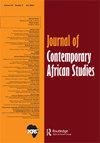加纳英语和阿坎语数量判断任务的文化适应
IF 0.8
Q2 AREA STUDIES
引用次数: 0
摘要
质量和可数性现象是多方面的,在许多学科中都有争议性的讨论。对于语言学来说,跨语言区分的形态句法标记的差异及其跨文化本体论-语义概念化特别有趣。然而,大多数关于质量和可计数性的研究都集中在(美式)英语上,在某种程度上也集中在欧洲和亚洲语言上。非洲语言和语境在可计数性研究中一直被忽视,而且用于研究可计数性的方法工具也没有考虑到周围的文化语境。本文介绍了根据Barner和Snedeker(2005)为美国英语使用者设计的数量判断任务的结果,该实验以加纳英语和阿坎语进行。加纳的实验揭示了对刺激及其适用性的重要关注,特别是对阿坎文化的关注。因此,受其他关于阿坎语语义研究的启发,我们提出了一套新的刺激,以对比研究加纳英语和阿坎语的质量和责任。在这种情况下,他们强调翻译在心理语言实验方面的不足和适当的文化适应的重要性。本文章由计算机程序翻译,如有差异,请以英文原文为准。
The cultural adaptation of quantity judgment tasks in Ghanaian English and Akan
The phenomenon of mass and countability is multifaceted and has been controversially discussed in many disciplines. For linguistics, differences in the morphosyntactic marking of the distinction cross-linguistically, and its cross-cultural ontological-semantic conceptualization are particularly interesting. However, most studies into mass and countability have focused on (American) English, and, to some extent European and Asian languages. African languages and contexts have as yet been neglected by researchinto countability, and the methodological tools employed to study it do not account for the ambient cultural contexts. This paper presents the results of a quantity judgment task designed according to Barner and Snedeker’s (2005) experiment for American English speakers, conducted in Ghanaian English and Akan. The Ghanaian experiments reveal important concerns regarding the stimuli and their applicability, especially to Akan culture. Thus, inspired by other studies into the semantics of Akan, a new set of stimuli is suggested in order to investigate mass and countability contrastively in Ghanaian English and Akan. In this vein, they emphasize the insufficiency of translations with regard to (psycho)linguistic experiments and the importance of proper cultural adaptation.
求助全文
通过发布文献求助,成功后即可免费获取论文全文。
去求助
来源期刊

Journal of Contemporary African Studies
AREA STUDIES-
CiteScore
2.20
自引率
0.00%
发文量
18
期刊介绍:
Journal of Contemporary African Studies (JCAS) is an interdisciplinary journal seeking to promote an African-centred scholarly understanding of societies on the continent and their location within the global political economy. Its scope extends across a wide range of social science and humanities disciplines with topics covered including, but not limited to, culture, development, education, environmental questions, gender, government, labour, land, leadership, political economy politics, social movements, sociology of knowledge and welfare. JCAS welcomes contributions reviewing general trends in the academic literature with a specific focus on debates and developments in Africa as part of a broader aim of contributing towards the development of viable communities of African scholarship. The journal publishes original research articles, book reviews, notes from the field, debates, research reports and occasional review essays. It also publishes special issues and welcomes proposals for new topics. JCAS is published four times a year, in January, April, July and October.
 求助内容:
求助内容: 应助结果提醒方式:
应助结果提醒方式:


